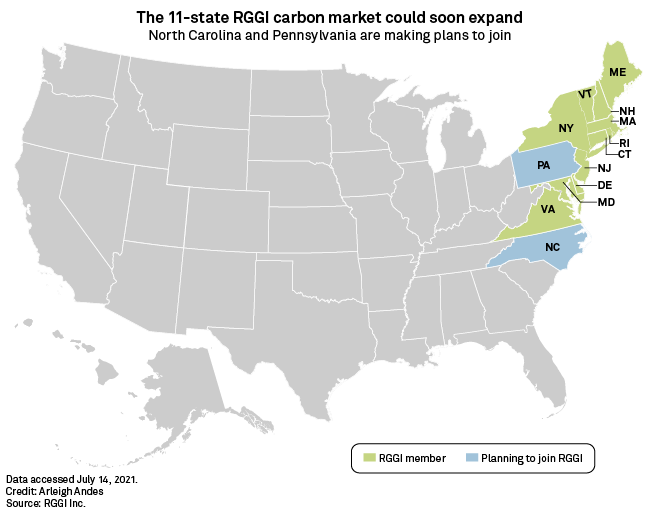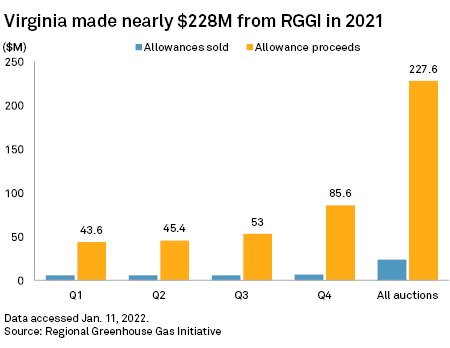S&P Global Offerings
Featured Topics
Featured Products
Events
S&P Global Offerings
Featured Topics
Featured Products
Events
S&P Global Offerings
Featured Topics
Featured Products
Events
Banking & Capital Markets
Economy & Finance
Energy Transition & Sustainability
Technology & Innovation
Podcasts & Newsletters
Banking & Capital Markets
Economy & Finance
Energy Transition & Sustainability
Technology & Innovation
Podcasts & Newsletters
S&P Global Offerings
Featured Topics
Featured Products
Events
19 Jan, 2022
By Karin Rives

| Glenn Youngkin was sworn in as the 74th governor of Virginia on Jan. 15, 2022, in the state capital of Richmond. Source: Anna Moneymaker/Getty Images News via Getty Images |
The first multistate effort to cut emissions from U.S. power plants could soon grow — or shrink — depending on how partisan battles over the Regional Greenhouse Gas Initiative play out in Virginia and Pennsylvania.
The RGGI controversy has created new uncertainties for utilities and investors in both states while intensifying a tug of war over carbon trading and its benefits and costs.
The program "will translate into electricity bills spiking by double digits, ballooning fuel costs and price increases on just about everything we use daily," asserted Gene Yaw, a Republican state senator from Pennsylvania and vocal opponent of his state's plans to enter RGGI this year. "Thousands of jobs will disappear, and zero-carbon emissions will be removed from the atmosphere. RGGI will spell disaster for our state."
RGGI advocates disagreed, saying proceeds from allowance auctions can defray any power bill increases and help save money in public health and other areas.
Hanging in the balance for Pennsylvania and Virginia — with North Carolina potentially joining soon — are hundreds of millions of dollars in annual proceeds from such auctions to beef up air pollution mitigation and energy efficiency programs.
Shifting policies, market uncertainty
An 11-state cooperative effort, the RGGI caps and reduces power-sector carbon emissions. Connecticut, Delaware, Maine, Maryland, Massachusetts, New Hampshire, New Jersey, New York, Rhode Island, Vermont and Virginia are participating in the program.
Virginia's new governor, Republican Glenn Youngkin, issued an executive order Jan. 15 — the day he was sworn into office — to reevaluate the state's participation in the 13-year-old cap-and-trade market. Youngkin pledged to immediately begin an emergency regulatory process to repeal the program, saying RGGI costs are overshadowing the benefits.
Virginia joined the initiative in July 2020 under bipartisan legislation signed by former Democratic Gov. Ralph Northam following a multiyear rulemaking by the state's Air Pollution Control Board. The RGGI is a building block of Virginia's sweeping Clean Economy Act, which requires the state's two large investor-owned utilities — Dominion Energy Inc. and Appalachian Power Co. — to become fossil-free by 2045 and 2050, respectively.
Citing the sudden "uncertainty" over the state's continued participation in RGGI and how that impacts its ongoing market compliance costs, Dominion told regulators Jan. 10 its $323.4 million retail rate adjustment covering such costs should be withdrawn.
A typical Dominion homeowner pays an average of $108 monthly for electricity, including $2.39 for the RGGI. Starting Sept. 1, when the latest RGGI rate increase would have gone into effect, that homeowner would have paid about $4.37 every month for the RGGI program, the utility estimated.
Dominion and Appalachian Power are required to purchase state-issued allowances in quarterly RGGI auctions for each ton of carbon their Virginia power plants emit. The price of one allowance reached $13 in the last auction, held Dec. 1, nearly twice what it was a year earlier.

In Pennsylvania, Democratic Gov. Tom Wolf continued to resist efforts by the state's Republican-majority legislature to keep the Keystone State from joining the RGGI compact in the second quarter of 2022. Wolf on Jan. 10 vetoed legislation seeking to kill his administration's rule that sets the RGGI entry in motion. Lawmakers now have 30 days to try to override that veto.
The override effort will likely fail, with Republicans lacking supermajorities in the state's House and Senate. As a last resort, RGGI opponents said they will litigate the matter, which could delay the state's participation in the carbon market.
"The debates in Pennsylvania and Virginia about whether or not the state should participate in the RGGI create uncertainty that makes it difficult for the utilities and market participants to develop cohesive, long-term strategic plans," said Lillian Federico, an energy research director with S&P Global Market Intelligence who focuses on state policies. "An added nuance in Pennsylvania is that the state senate has refused to confirm any new appointments to the Pennsylvania Public Utility Commission unless the governor rolls back his RGGI mandate."
If the governor and lawmakers cannot "get on the same page," the spat over commission appointments could grind regulatory proceedings in the state to a "virtual halt," Federico said.
Like Pennsylvania, North Carolina has a Democrat as governor and a GOP legislature. Under Gov. Roy Cooper, the N.C. Department of Environmental Quality is developing a fiscal note that will lead to the launch of a rulemaking process for the state to join the RGGI, agency spokeswoman Sharon Martin confirmed in an email.
$228M windfall
With record-high allowance prices, RGGI delivered $227.6 million in proceeds to Virginia in 2021, the first year the state participated in the trading market. The money has been earmarked for coastal resilience projects and energy conservation programs benefiting low-income households.
In 2021, the Virginia Community Flood Preparedness Fund awarded more than $32 million to local government organizations to help them better address flooding, sea-level rise and other projects along the state's exposed coast. Another $24 million was awarded for such projects in December. RGGI proceeds also helped to build and retrofit more than 900 energy-efficient and affordable housing units across the state in 2021, according to Alexis Carey, a spokeswoman for the Virginia Department of Housing and Community Development.
Youngkin's press office did not return several requests for comment on how the revenue has been a bad deal for Virginians.

Battle over cost
The RGGI carbon market has been credited with helping to cut carbon pollution in half in the New England and mid-Atlantic regions and was once viewed as a model for a nationwide program.
Carbon dioxide pollution from power plants in RGGI states dropped 47% between 2008 and 2017, according to an often-cited study by the nonprofit Acadia Center, a proponent of carbon markets. To date, RGGI allowance auctions have raised $4.7 billion in proceeds for the states.
But critics such as Yaw have pointed to high energy prices in New England as a reason why Pennsylvania should stay out of the RGGI.
"In some RGGI states, residents pay double the rates paid by Pennsylvanians," Yaw warned in a December op-ed published in the Delaware Valley Journal. The RGGI "will cause an 18% increase in rates," Yaw wrote.
In reality, homes and businesses in New England already paid significantly higher bills than ratepayers in many states when the RGGI held its first auction in 2009. High transmission costs and the region's dependency on LNG during winter months mean that New England homes and businesses pay roughly 55% more for electricity than the national average, said Michelle Solomon, a policy analyst focusing on power sector transformation issues for the think tank Energy Innovation.
Power prices across the RGGI market fell by 5.7% while increasing 8.6% in the rest of the country, the Acadia study found.
Mark Szybist, a senior attorney with the Natural Resources Defense Council, looked at RGGI allowance prices' share of the "locational marginal prices" in the PJM Interconnection LLC's day-ahead wholesale market, using PJM market monitor data from 2011 to 2021. Szybist concluded RGGI costs only accounted for 2% of wholesale costs in 2021 when allowances were sold at record prices. It was well below 1% in most other years.
For people in Pennsylvania, who are billed separately for generation and distribution of power, the RGGI cost comes to a "fraction of a fraction," Szybist said. "RGGI opponents are cherry-picking data and conflating electric wholesale prices with electricity bills to try to confuse Pennsylvanians about what the impact of RGGI participation would be."
Youngkin's RGGI gamble
Cost debates aside, Virginia's new governor might soon find turning regulations around in the Commonwealth easier said than done, said Cale Jaffe, a law professor at the University of Virginia and director for the school's Environmental Law and Community Engagement Clinic.
"The statutory language in the Virginia code authorized the state Air Pollution Control Board to adopt regulations to join RGGI, and the board has duly promulgated those regulations," Jaffe said. "The only actor with authority to amend those regulations would be the board."
The only way for the governor to get this powerful seven-member board on his side would be to appoint new people. Because the four-year appointments are staggered, the soonest a critical number of new members could be seated to possibly overturn the RGGI regulations would be in June 2023, Jaffe said.
Launching a new rulemaking to kill the state's RGGI program would also create regulatory uncertainty and raise questions over how the state will meet its energy transition goals, Jaffe added. "It would just create a lot of confusion," he said.
The departing Virginia attorney general issued a similar opinion in response to a request from two lawmakers on Jan. 11. "The Constitution of Virginia does not grant the Governor the power to suspend laws, and in fact it requires the opposite," Mark Herring wrote in his advisory opinion.
